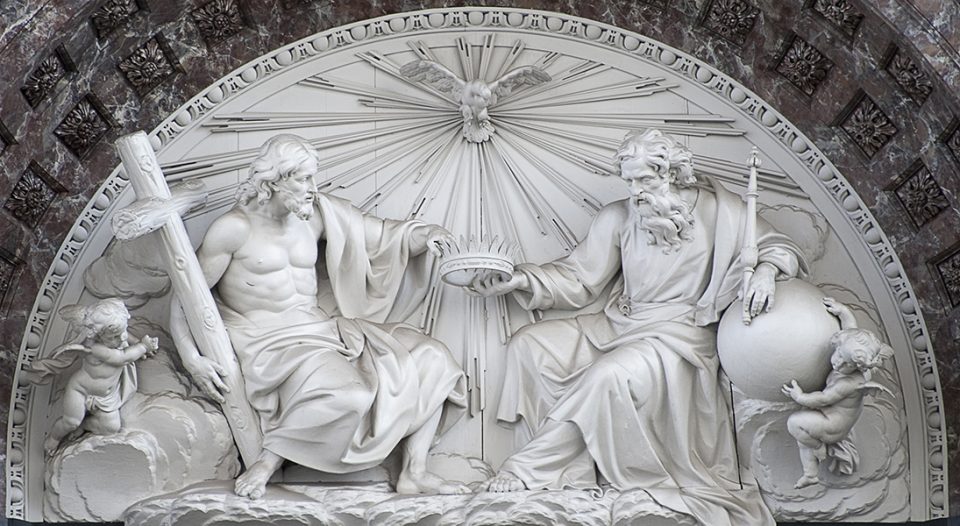Lectionary for June 12, 2022
Trinity Sunday/First Sunday after Pentecost
Proverbs 8:1-4, 22-31; Psalm 8;
Romans 5:1-5; John 16:12-15
In this week’s Gospel reading, Jesus gives direct testimony about the Spirit. Certainly, the Spirit hasn’t been absent from the biblical text to this point, but Jesus’ closing speech to his disciples in John and the first Christian Pentecost in Acts reveal the Spirit in a way that we haven’t previously known. In John 16, Jesus reintroduces his disciples to the Spirit and then tells them how much they—and he—will depend on the Spirit.
In the Gospel of John, we see that Jesus has been describing the Spirit’s activities for some time. The Spirit will convict the world with regard to sin, righteousness and judgment (16:8) and will testify to the world about who Jesus is, seemingly independent of the work of human disciples (15:27—“[the Spirit] will testify about me, and you will testify also”). This week, we read about the “Spirit of truth.”
Jesus knew that after his death, resurrection and ascension, there would be confusion and rumors about what had actually happened. What would people think about his band of disciples (numbering around a hundred) rejoicing that their dead rabbi had triumphed over the powers of sin and death in order to welcome all people(s) to the earthly and heavenly parties that don’t stop? If I were a first-century Roman Jew, like Paul, I might have had serious doubts about whether the so-called “Spirit of truth” was on my side. And, truthfully, the Spirit was not by their side. Indeed, the Spirit was—and is—out front, going into places that don’t make sense, among folks whom we don’t know or trust. Acts is a series of questions about who else could be included in the Jesus movement. Non-Galilean Jews? Samaritans? Ethiopians? Romans? Greeks? Even Europeans? Absolutely!
Jesus and the Spirit draw from a common supply of truth, power and wisdom: that of God the Father (John 16:14-15).
But Jesus’ disciples, almost all of them from Galilee, couldn’t know how their rabbi’s name and power would spread so quickly through the Spirit’s testimony. How could they? Jesus had already told them so much that they couldn’t fully digest. What does abundant and full life really mean anyway? Like any good instructor, Jesus knew when the material went beyond his students. As an educator, I’m always excited to point out that Jesus promises that the Spirit will partner equally with him to teach his disciples.
Jesus had much more that he wanted to teach his disciples, but they weren’t ready to hear it (John 16:12). He had already promised that the Spirit would come to remind them of what he had taught and to teach everything they didn’t have the capacity to learn from him (John 14:26). Indeed, Jesus, without any sense of jealousy, told his disciples that it would be better when he left them (John 16:7) because the Spirit couldn’t be given fully until he went away (John 7:39, 16:7). This invites all sort of fruitful meditation on the relative strengths of God, Jesus and the Spirit. Is the Spirit the best educator, while Jesus is the best intercessor? At any rate, there is no competition—just cooperation. Jesus and the Spirit draw from a common supply of truth, power and wisdom: that of God the Father (John 16:14-15). They share disciples, truth and glory in a mutually giving, serving and edifying relationship.
That’s all well and good for God, but where is the good news for us? I think it’s this: in the United States, we are grappling with COVID-19, passionate disagreements concerning which and whose bodies are protected by which laws, continued racial injustice and violence, how best to respond to wars and rumors of wars overseas, and how to work together to steward creation. At least for me, it’s more than I can humanly deal with all at once. I know I don’t understand enough to speak confidently on many of the issues facing friends and neighbors around the planet. But hear the good news: Jesus already knows that. He knows I need more of God’s wisdom than I can handle in any one moment. And the Spirit is a patient teacher of truth, leading by example, going ahead of us and daring, compelling and inviting us to follow in truth and love.





